Search
To search for an exact match, type the word or phrase you want in quotation marks.
A*DESK has been offering since 2002 contents about criticism and contemporary art. A*DESK has become consolidated thanks to all those who have believed in the project, all those who have followed us, debating, participating and collaborating. Many people have collaborated with A*DESK, and continue to do so. Their efforts, knowledge and belief in the project are what make it grow internationally. At A*DESK we have also generated work for over one hundred professionals in culture, from small collaborations with reviews and classes, to more prolonged and intense collaborations.
At A*DESK we believe in the need for free and universal access to culture and knowledge. We want to carry on being independent, remaining open to more ideas and opinions. If you believe in A*DESK, we need your backing to be able to continue. You can now participate in the project by supporting it. You can choose how much you want to contribute to the project.
You can decide how much you want to bring to the project.
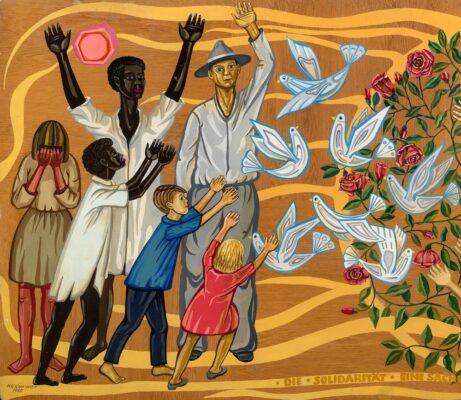
In the current climate marked by structural racism and wars, some contend that the traditional white leftist ethos has lost its resonance, if not its very existence. But let’s journey back in time to an era when socialism-communism held its way as a dominant narrative, at least across half of the planet. At that time, the German Democratic Republic (GDR) was a socialist project born behind the powerful emerging Russian communism of post-WWII and it was conceived following the partitioning of territory among the victorious powers, thus, it embodied a distinct socialist vision within the geopolitical landscape of the time.
Rooted in this historical background, the “Echoes of the Brother Countries” group exhibition and research project embodies a polyphonic venture. Currently on display at Haus der Kulturen der Welt (HKW) until May 20, it engages in a dialectical exploration of transnational solidarities within the GDR, unraveling the intricacies of anti-imperialism, while confronting the obscured narratives and suppressed truths of yesteryears and their enduring reverberations in contemporary discourse.
As a point of departure, the exhibition raises a plethora of inquiries: What unfolds when a nation vanishes, not in physicality nor territory, but in the political annals as a state? What transpires when the country is engulfed by its counterpart? What if Germania, as a whole, was once a creature bicephalous in form, with the GDR and FRG (Federal Republic of Germany) as its twin heads. Just as Saturn feared being usurped by his offspring and devoured his own children, the GDR was metaphorically consumed by the FRG, reflecting the relentless cycle of power and succession throughout history.
What if the GDR, the promising state fell short of its expectation? And finally after disintegration and reintegration, how did the newly reborn unified capitalist entity contend with the post-exchange and post-migration movements between the GDR and other socialist-oriented states, known as the “brother countries”? How did the new state manage the bureaucratic complexities inherited from its predecessor? How did it respond to those individuals who were granted visas, work permits, etc.?
From 1949 to 1990, an influx of individuals journeyed to the GDR from nations such as Algeria, Angola, Chile, Cuba, Guinea-Bissau, Mozambique, Syria, and Vietnam, yet their narratives remain shrouded in historical obscurity. This project delves deep into the labyrinthine network of political, economic, educational, and artistic affiliations that flourished between the GDR and its socialist brother countries. “Echoes of the Brother Countries” and its research odyssey serves as an intellectual agora, a crucible of diverse perspectives fostering dialogue, retrospection, and critical inquiry into the many-sided tapestry of transnational solidarities and their inherent paradoxes. Through its ongoing program attempts to decode the persistent imprint of these entwined histories upon the post-GDR sociopolitical fabric, focusing on the lived experiences of those who traversed borders amongst the alliances of yesteryears.
Beneath the veneer of iconic depictions portraying a “unified class struggle” and “socialist internationalism”, a shadow realm emerges. Despite the GDR’s rhetoric of equitable labor paradigms and professional ascension, migrants faced a litany of tribulations: exploitation, overcrowded domiciles, surveillance, curtailment of personal liberties: which included prohibitions against getting pregnant or having a relationship, racial and xenophobic violence, withheld wages, and unfulfilled pledges by both their governments and GDR authorities.
Yet, amidst this backdrop and dystopian tableau, pockets of solidarity emerged across varied positions – individual, communal, national, and global. Moreover, the exhibition introduces fresh and invigorating leftist narratives, rooted in the legacy of historical socialist internationalism but within our contemporary discourse and evolving towards the emergence of Afrocommunism. As is the inclusion of its manifesto within the multifaceted piece by Angolan Kiluanji Kia Henda titled “The Cemetery of Boats”, marking a significant and poignant moment that signifies a transformative shift in the hegemonic ideological discourse.
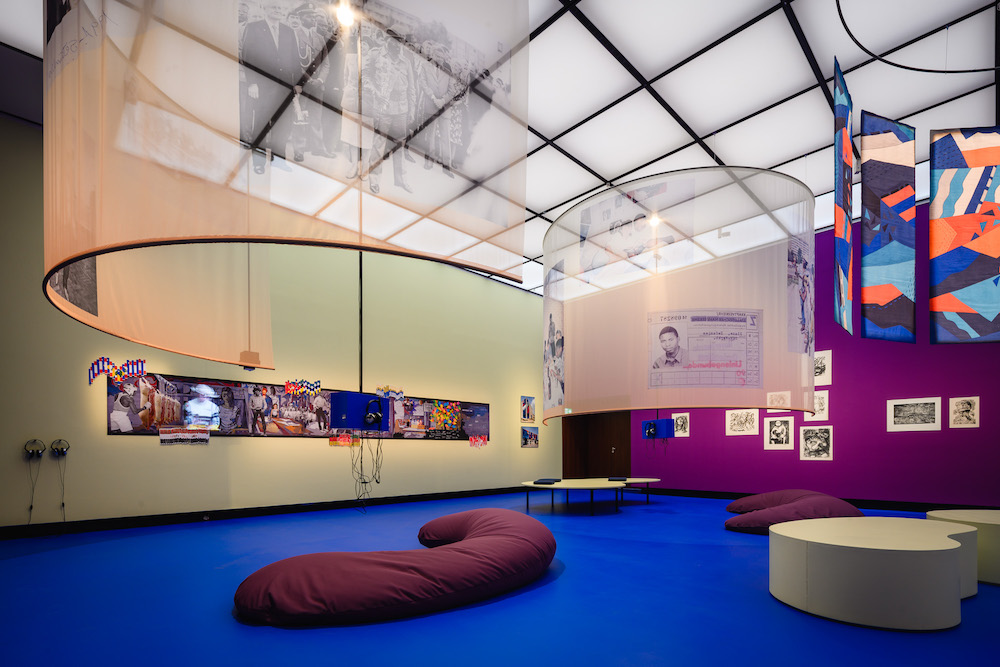
Exhibition view “Echoes of the Brother Countries”
Needless to say, the exhibition’s formal elements and vivid, colorful rooms make a lasting impression on visitors. Curated by Paz Guevara and Marie Helene Pereira, “Echoes of the Brother Countries” is interdisciplinary in its essence. Furthermore, the exhibition unfolds within the expansive confines of the museum, extending its narrative both indoors and outdoors. Outside at the entrance, attendees encounter grand-scale fantastic murals by Chilean Cesar Olhagaray and Mozambican Dito Tembe. In the foyer, a table shaped like a snake displays various types of documents. The main exhibition space houses a diverse array of mediums, including video installations, paintings, sculptures, posters, and documentation. An alternative room presents visual-to-auditory expanded experiences named “Thematic Resonances,” complemented by video, photos, and the “Intergenerational Solidarities: Graphic Novel Workshop,” providing the public with a polyvalent engagement with the artistic dialogue. The tour culminates on the terrace, where Nigerian artist Olu Oguibe’s thought-provoking piece is displayed: three flags united under the title “DDR: Decarbonize, Decolonize, Rehabilitate” – DDR is the german acronym for GDR.
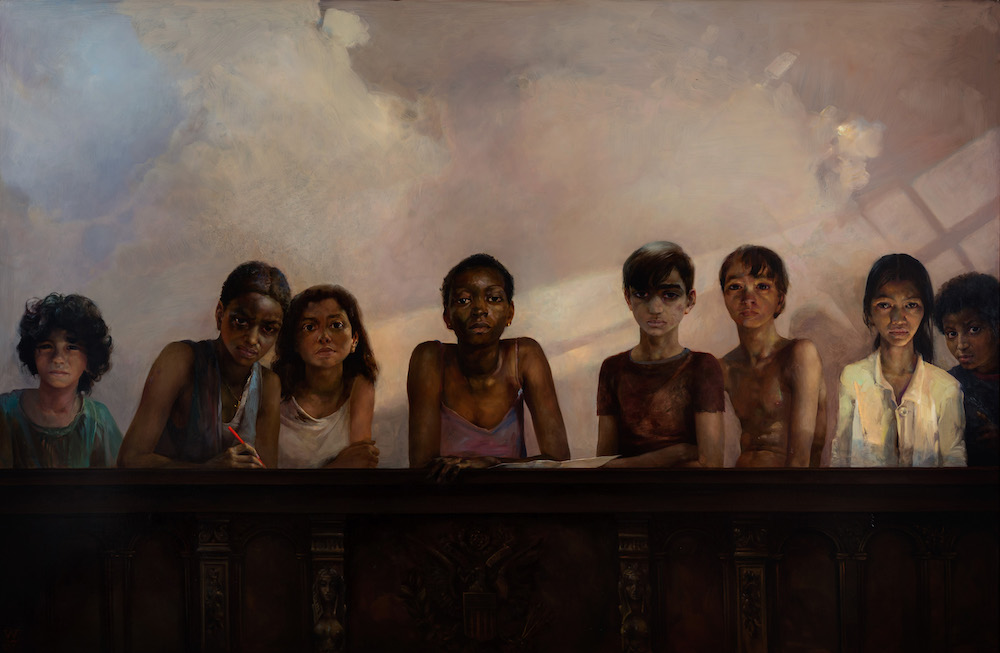
Christoph Wetzel, “Das jüngste Gericht [The last judgement] (1987)”, oil on fibreboard © VG Bild-Kunst, Bonn 2024, courtesy of Museum Utopie und Alltag (Kunstarchiv Beeskow)
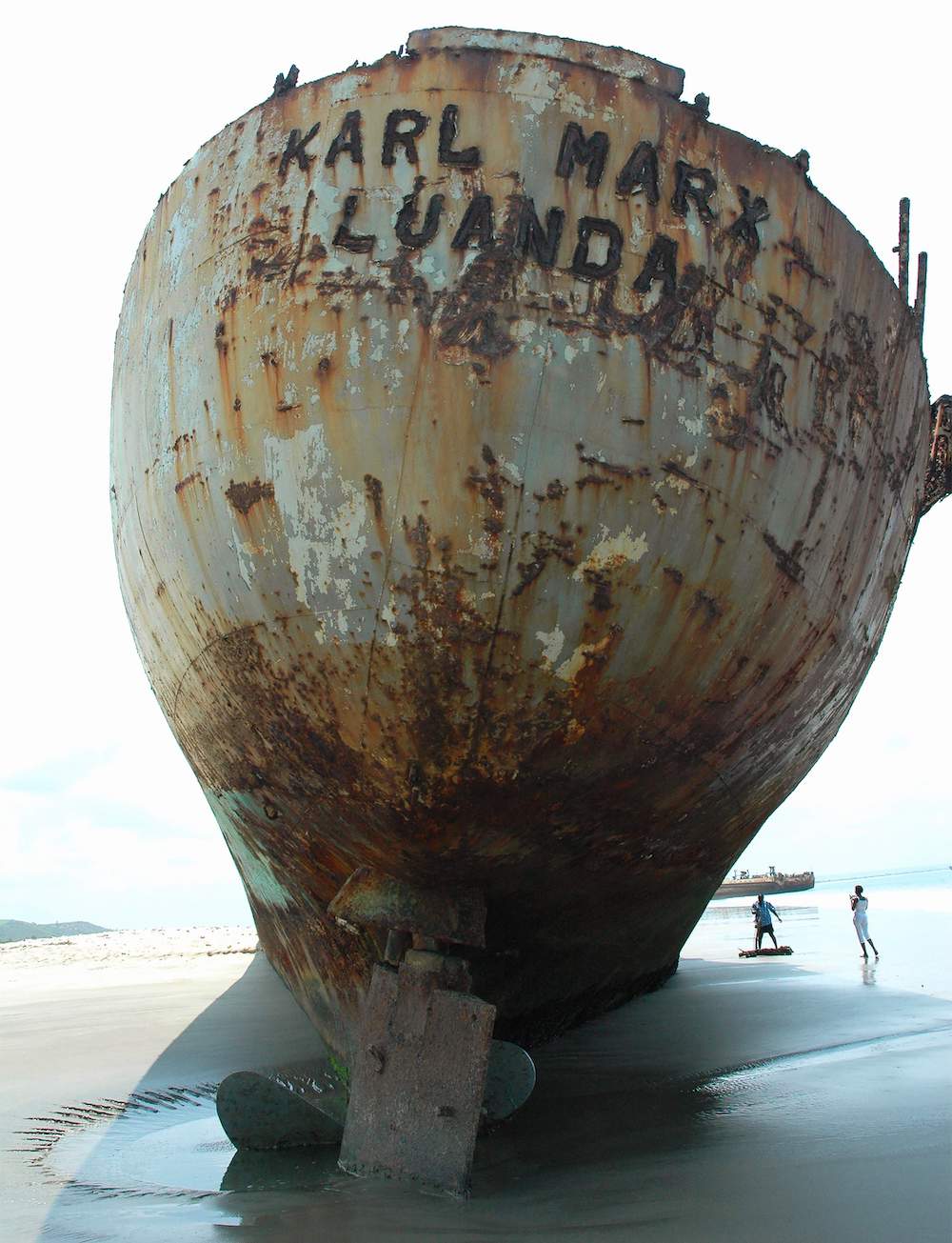
Kiluanji Kia Henda, Karl Marx, Luanda (2005), detail. Courtesy of Galleria Fonti, Naples

César Olhagaray, Solidarität [Solidarity] (1986/2024), mural, mixed media on canvas, reproduction © VG Bild-Kunst, Bonn 2024, courtesy of the artist
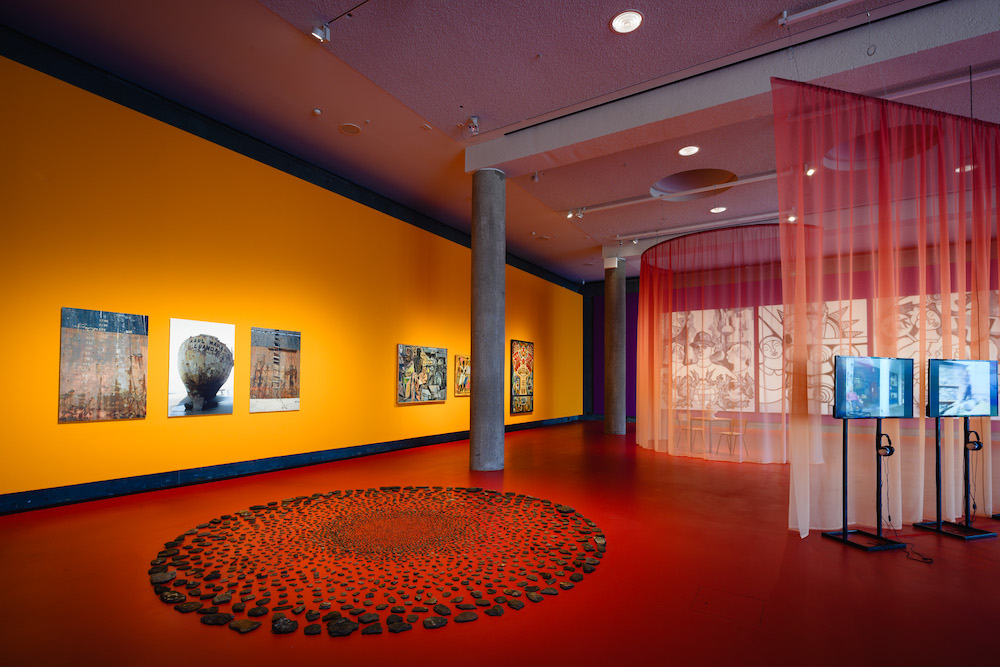
Exhibition view “Echoes of the Brother Countries”
Cover image: Heinz-Karl Kummer, “Solidarität [Solidarity]” (1978), oil on wood. Photo: Thomas Kläber, courtesy Museum Utopie und Alltag (Kunstarchiv Beeskow) and Estate Heinz-Karl Kummer
All photographs: Hannes Wiedemann/HKW.
“Echoes of the Brother Countries. What is the Price of Memory and What is the Cost of Amnesia? Or: Visions and Illusions of Anti-Imperialist Solidarities”, Haus der Kulturen der Welt (HKW), 2024.
More info at hkw.de/en
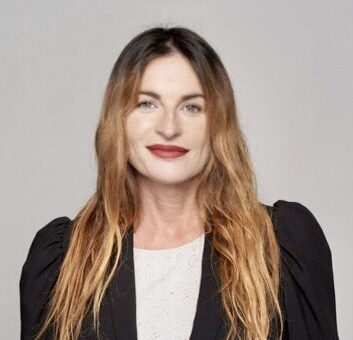
María Muñoz-Martínez is a cultural worker and educator trained in Art History and Telecommunications Engineering, this hybridity is part of her nature. She has taught “Art History of the first half of the 20th century” at ESDI and currently teaches the subject “Art in the global context” in the Master of Cultural Management IL3 at the University of Barcelona. In addition, while living between Berlin and Barcelona, she is a regular contributor to different media, writing about art and culture and emphasising the confluence between art, society/politics and technology. She is passionate about the moving image, electronically generated music and digital media.
Portrait: Sebastian Busse
"A desk is a dangerous place from which to watch the world" (John Le Carré)